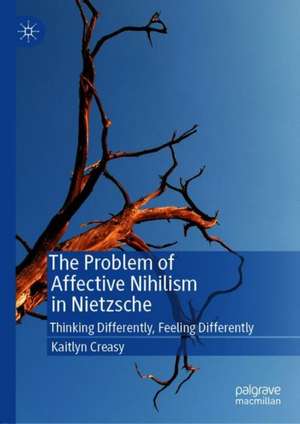The Problem of Affective Nihilism in Nietzsche: Thinking Differently, Feeling Differently
Autor Kaitlyn Creasyen Limba Engleză Hardback – 11 iun 2020
Nietzsche is perhaps best known for his diagnosis of the problem of nihilism. Though his elaborations on this diagnosis often include descriptions of certain beliefs characteristic of the nihilist (such as beliefs in the meaninglessness or worthlessness of existence), he just as frequently specifies a variety of affective symptoms experienced by the nihilist that weaken their will and diminish their agency. This affective dimension to nihilism, however, remains drastically underexplored. In this book, Kaitlyn Creasy offers a comprehensive account of affective nihilism that draws on Nietzsche’s drive psychology, especially his reflections on affects and their transformative potential. After exploring Nietzsche’s account of affectivity (illuminating especially the transpersonal nature of affect in Nietzsche’s thought) and the phenomenon of affective nihilism, Creasy argues that affective nihilism might be overcome by employing a variety of Nietzschean strategies: experimentation, self-narration, and self-genealogy.
| Toate formatele și edițiile | Preț | Express |
|---|---|---|
| Paperback (1) | 528.80 lei 6-8 săpt. | |
| Springer International Publishing – 11 iun 2021 | 528.80 lei 6-8 săpt. | |
| Hardback (1) | 528.80 lei 6-8 săpt. | |
| Springer International Publishing – 11 iun 2020 | 528.80 lei 6-8 săpt. |
Preț: 528.80 lei
Preț vechi: 622.11 lei
-15% Nou
Puncte Express: 793
Preț estimativ în valută:
101.18€ • 105.65$ • 83.55£
101.18€ • 105.65$ • 83.55£
Carte tipărită la comandă
Livrare economică 15-29 aprilie
Preluare comenzi: 021 569.72.76
Specificații
ISBN-13: 9783030371326
ISBN-10: 3030371328
Pagini: 138
Ilustrații: XII, 188 p. 1 illus.
Dimensiuni: 148 x 210 x 18 mm
Greutate: 0.45 kg
Ediția:1st ed. 2020
Editura: Springer International Publishing
Colecția Palgrave Macmillan
Locul publicării:Cham, Switzerland
ISBN-10: 3030371328
Pagini: 138
Ilustrații: XII, 188 p. 1 illus.
Dimensiuni: 148 x 210 x 18 mm
Greutate: 0.45 kg
Ediția:1st ed. 2020
Editura: Springer International Publishing
Colecția Palgrave Macmillan
Locul publicării:Cham, Switzerland
Cuprins
1. Introduction.- 2. Nietzsche’s Genealogy of Nihilism.- 3. Nihilism as Life-Denial.- 4. Before Affective Nihilism, Understanding Affect.- 5. The Problem of Affective Nihilism.- 6. Affective Nihilists, Weak Agents.- 7. Who is Nietzsche’s Affective Nihilist?: Thinking Cognitive Nihilism, Affective Nihilism, and their Interplay.- 8. Overcoming Affective Nihilism.
Notă biografică
Kaitlyn Creasy is Assistant Professor of Philosophy at California State University, San Bernardino. Her work has been published in the Journal of Nietzsche Studies, Environmental Philosophy, and anthologies in Nietzsche studies and environmental philosophy.
Textul de pe ultima copertă
Nietzsche is perhaps best known for his diagnosis of the problem of nihilism. Though his elaborations on this diagnosis often include descriptions of certain beliefs characteristic of the nihilist (such as beliefs in the meaninglessness or worthlessness of existence), he just as frequently specifies a variety of affective symptoms experienced by the nihilist that weaken their will and diminish their agency. This affective dimension to nihilism, however, remains drastically underexplored. In this book, Kaitlyn Creasy offers a comprehensive account of affective nihilism that draws on Nietzsche’s drive psychology, especially his reflections on affects and their transformative potential. After exploring Nietzsche’s account of affectivity (illuminating especially the transpersonal nature of affect in Nietzsche’s thought) and the phenomenon of affective nihilism, Creasy argues that affective nihilism might be overcome by employing a variety of Nietzschean strategies: experimentation, self-narration, and self-genealogy.
Caracteristici
Presents a detailed and focused study of the problem of affective nihilism–nihilism as a feeling-based phenomenon–in the work of Friedrich Nietzsche Addresses long-standing questions about agency in Nietzsche Introduces the potential that ideas have to transform bodies
